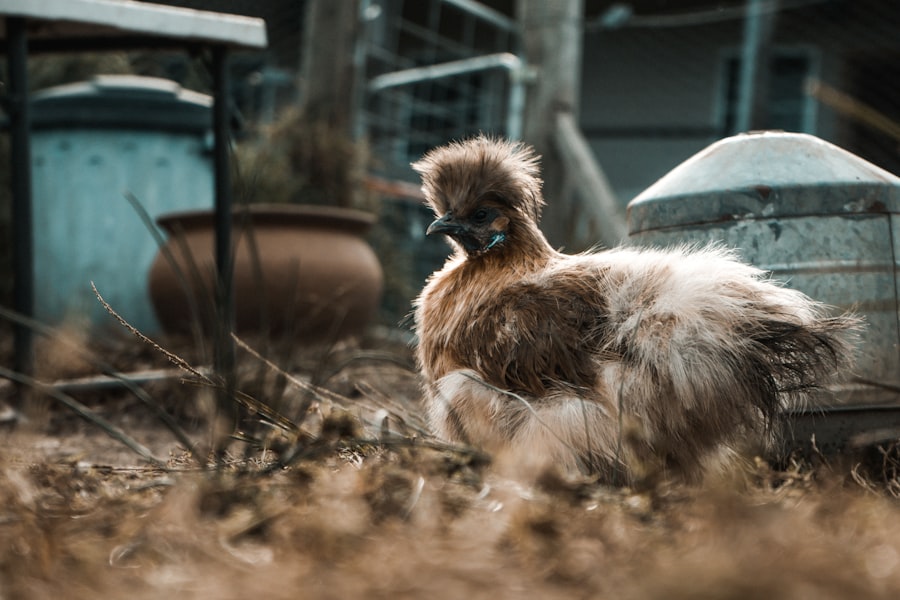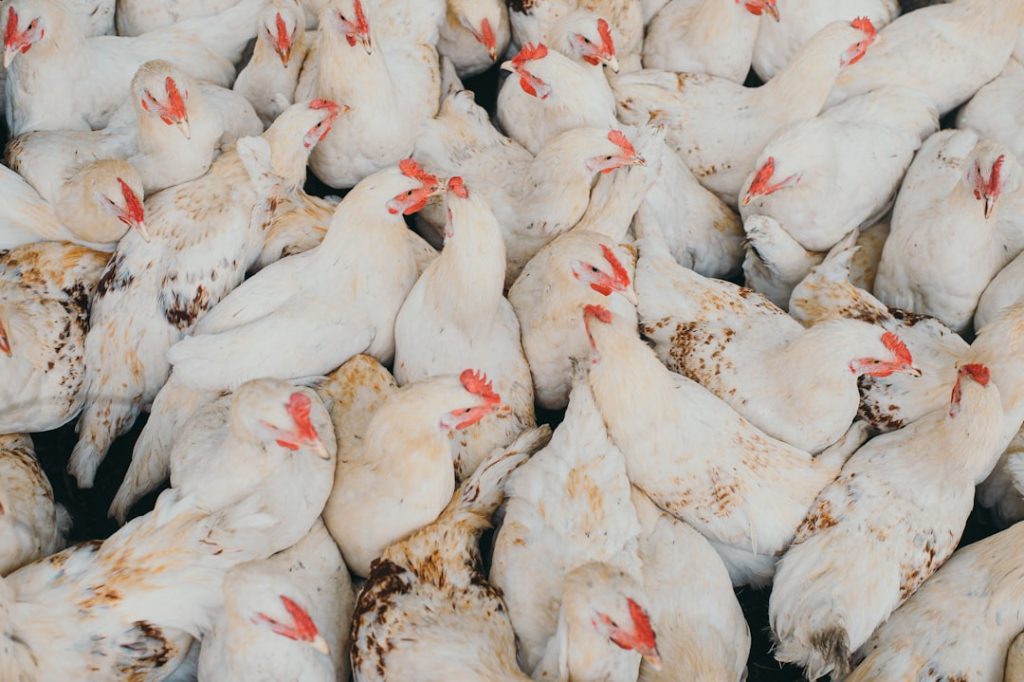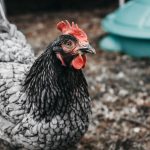Raising chickens and guineas together can be beneficial for poultry keepers. These two species possess distinct traits that can complement each other when cohabiting. Chickens are primarily valued for their egg production and generally calm demeanor, while guineas excel at pest control and serve as effective sentinels against potential threats.
Successfully integrating these birds requires an understanding of their unique characteristics and the creation of an appropriate shared habitat. This article examines the key aspects of maintaining a mixed flock of chickens and guineas, including their behavioral differences, housing requirements, nutritional needs, health considerations, social interactions, and other important factors to ensure a harmonious coexistence.
Table of Contents
- 1 Understanding the Differences Between Chickens and Guineas
- 2 Creating a Suitable Living Environment for Chickens and Guineas
- 3 Feeding and Nutrition for Chickens and Guineas
- 4 Health and Disease Management for Chickens and Guineas
- 5 Managing Social Dynamics Between Chickens and Guineas
- 6 Conclusion and Final Considerations for Keeping Chickens and Guineas Together
- 7 FAQs
- 7.1 Can chickens and guineas be kept together?
- 7.2 What are the benefits of keeping chickens and guineas together?
- 7.3 Are there any drawbacks to keeping chickens and guineas together?
- 7.4 What should be considered when keeping chickens and guineas together?
- 7.5 What do chickens and guineas eat?
- 7.6 Do chickens and guineas require different housing?
Key Takeaways
- Chickens and guineas can be kept together, but it’s important to understand their differences and needs.
- Chickens and guineas have different behaviors, communication styles, and social structures.
- Providing a suitable living environment with separate roosting areas and nesting boxes is crucial for keeping chickens and guineas together.
- Feeding and nutrition for chickens and guineas should be tailored to their specific dietary requirements.
- Regular health checks, disease management, and monitoring social dynamics are essential for maintaining a harmonious flock of chickens and guineas.
Understanding the Differences Between Chickens and Guineas
Chicken Characteristics
Chickens are domesticated birds renowned for their egg-laying abilities and are often raised for meat as well. They come in various breeds, each with its unique characteristics such as egg color, size, and temperament.
Guinea Fowl Traits
On the other hand, guineas are native to Africa and are known for their exceptional insect control abilities. They have a distinct appearance with a helmet-like crest on their heads and a loud, distinctive call. Guineas are also known for their alertness to predators, making them excellent watch birds.
Co-Habitation and Care
Understanding these differences is crucial when keeping chickens and guineas together, as it allows poultry keepers to provide the appropriate care and management for each type of bird.
Creating a Suitable Living Environment for Chickens and Guineas

When keeping chickens and guineas together, it is important to create a suitable living environment that meets the needs of both types of birds. This includes providing adequate shelter, space, and protection from predators. Chickens typically require a coop with nesting boxes for laying eggs, perches for roosting, and access to a run for exercise.
Guineas, on the other hand, prefer to roost in trees or high places at night and require a larger area to roam during the day. Providing a secure coop or shelter for both chickens and guineas is essential to protect them from predators such as foxes, raccoons, and birds of prey. Additionally, ensuring that the living environment is clean and well-maintained is important for the health and well-being of both types of birds.
Feeding and Nutrition for Chickens and Guineas
Feeding and nutrition are important aspects of keeping chickens and guineas together. While both types of birds can eat a similar diet consisting of commercial poultry feed, grains, fruits, and vegetables, there are some differences in their nutritional requirements. Chickens require a higher protein diet to support egg production, while guineas are more efficient at foraging for insects and may require less supplemental feed.
It is important to provide access to fresh water at all times for both chickens and guineas, as dehydration can lead to health issues. Additionally, offering grit or small stones to both types of birds is important for digestion, as they do not have teeth and rely on grit to grind their food in their gizzards. Understanding the specific nutritional needs of chickens and guineas is essential for maintaining their health and productivity.
Health and Disease Management for Chickens and Guineas
Maintaining the health of chickens and guineas is crucial when keeping them together. Both types of birds are susceptible to various diseases and parasites that can impact their well-being. It is important to provide regular health checks for both chickens and guineas to monitor for signs of illness or injury.
Additionally, practicing good biosecurity measures such as quarantining new birds before introducing them to the existing flock can help prevent the spread of diseases. Providing a clean living environment, regular access to fresh water, and a balanced diet can also contribute to the overall health of chickens and guineas. It is important to be aware of common poultry diseases such as coccidiosis, respiratory infections, and external parasites, as well as their respective prevention and treatment methods.

Introducing Guineas to the Flock
When introducing guineas to an existing chicken flock, it is essential to monitor their interactions to ensure that they are not being bullied or excluded by the chickens.
Guineas have their own social structure based on pairs or small groups, so providing them with adequate space to establish their own territory within the flock is vital. Additionally, providing multiple feeding and watering stations can help prevent competition between chickens and guineas.
Maintaining Harmony
Observing the interactions between chickens and guineas can help poultry keepers identify any potential issues and make adjustments as needed to ensure a harmonious coexistence.
Conclusion and Final Considerations for Keeping Chickens and Guineas Together
In conclusion, keeping chickens and guineas together can be a rewarding experience for poultry enthusiasts when done with careful consideration of their differences and needs. Understanding the unique characteristics of chickens and guineas, creating a suitable living environment, providing appropriate feeding and nutrition, managing health and disease prevention, and monitoring social dynamics are all important aspects of successfully keeping these two types of birds together. By taking these factors into account, poultry keepers can enjoy the benefits of both chickens’ egg-laying abilities and guineas’ insect control while maintaining the health and well-being of their flock.
It is important to continuously observe the interactions between chickens and guineas and make adjustments as needed to ensure a harmonious coexistence within the flock. With proper care and management, keeping chickens and guineas together can be a fulfilling experience for poultry enthusiasts.
If you’re considering keeping chickens and guineas together, you may want to read about the best kind of coop for chickens on Poultry Wizard’s website. This article discusses the different types of coops available and which one would be most suitable for your flock. Check it out here.
FAQs
Can chickens and guineas be kept together?
Yes, chickens and guineas can be kept together in the same coop and run. They can coexist peacefully as long as there is enough space and resources for both species.
What are the benefits of keeping chickens and guineas together?
Keeping chickens and guineas together can provide pest control for your property, as guineas are known for their bug-eating abilities. Additionally, they can provide companionship for each other and help to keep each other safe from predators.
Are there any drawbacks to keeping chickens and guineas together?
One potential drawback is that guineas can be noisy, especially when they feel threatened or when they are alerting the flock to potential danger. This noise can be disruptive, especially in residential areas.
What should be considered when keeping chickens and guineas together?
It’s important to provide enough space for both chickens and guineas to roam and forage. Additionally, it’s important to monitor their interactions to ensure that there is no aggression or bullying between the two species.
What do chickens and guineas eat?
Chickens and guineas have similar dietary needs and can eat a combination of commercial poultry feed, grains, fruits, vegetables, and insects. It’s important to provide a balanced diet to ensure their health and well-being.
Do chickens and guineas require different housing?
Chickens and guineas can be housed together in the same coop and run, as long as there is enough space for both species. It’s important to provide roosting space and nesting boxes for the chickens, as well as shelter and perches for the guineas.
Meet Walter, the feathered-friend fanatic of Florida! Nestled in the sunshine state, Walter struts through life with his feathered companions, clucking his way to happiness. With a coop that’s fancier than a five-star hotel, he’s the Don Juan of the chicken world. When he’s not teaching his hens to do the cha-cha, you’ll find him in a heated debate with his prized rooster, Sir Clucks-a-Lot. Walter’s poultry passion is no yolk; he’s the sunny-side-up guy you never knew you needed in your flock of friends!







